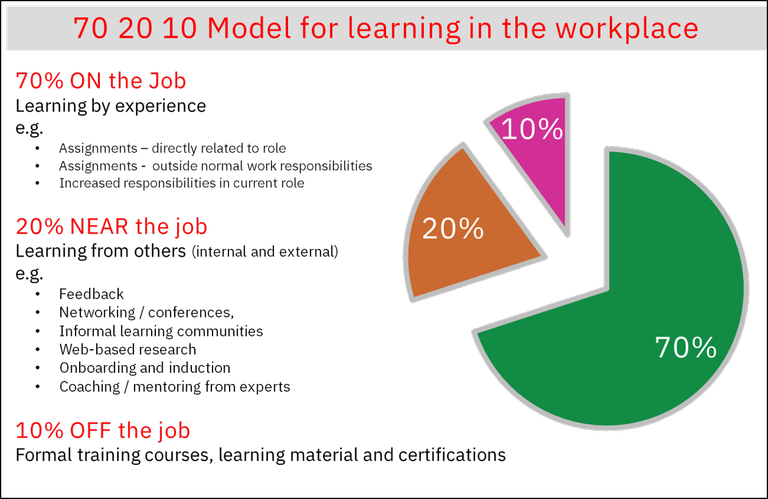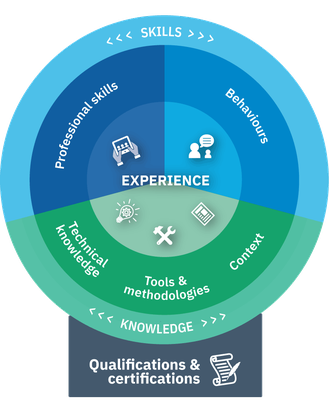SFIA and Bodies of Knowledge
Guidance on industry Bodies of Knowledge (BoKs) and the relationship between SFIA skills, competency levels and knowledge.
What is a Body of Knowledge (BoK)?
A Body of Knowledge is described variously as:
- structured knowledge that is used by members of a discipline to guide their practice or work.
- the prescribed aggregation of knowledge in a particular area an individual is expected to have mastered to be considered or certified as a practitioner.
- a stepping stone to unifying a community
The professional disciplines in the scope of the SFIA framework are well supported by a variety of BoKs. Some are well established and some are emerging. In addition, many of the well-established industry frameworks while not labelled as a BoK, have many of the features of being a BoK.
If knowledge is so important - why doesn't the SFIA framework describe the knowledge needed by professional disciplines?
In short; the scope is both too wide and too specific to each discipline and organisation for a centralised approach.
- Knowledge is highly context-sensitive, to industries, employers, technologies, methods, tools, job roles, etc
- Knowledge changes rapidly and the responsibility for keeping up to date lies with the people who are leading, managing or doing the work
- There are often national interpretations of knowledge e.g. legal and regulatory requirements,
As a framework - SFIA is not competing with bodies of knowledge but actively promoting their importance and helping individuals and organisations understand how knowledge, skills and competency fit together.
The SFIA Foundation approach is to work in collaboration with industry players who are best positioned to collate and maintain detailed bodies of knowledge.
In return - the role of the SFIA framework is to describe professional skills and competency levels and also to reinforce the need for knowledge through the integrated view of competency.
If you represent a body of knowledge or industry framework and would like to explore collaboration with SFIA, please contact the SFIA Foundation General Manager.
Well established Bodies of Knowledge
- These BoKs tend to be formal sources which are created and maintained by recognised industry or professional bodies.
- With decades of knowledge sources in scope, they typically describe themselves as a "Guide to the Body of Knowledge". This is to highlight that the BoK helps individuals navigate to their destination rather than aspires to be a single source of everything ever written about the discipline.
- Although many have the appearance and functionality of a wiki - they are likely to be under formal governance to maintain quality for their established user groups. e.g. to support curriculum development for education or professional development.
Informal / Emerging Bodies of Knowledge
- A feature of the SFIA-related disciplines and knowledge work, in general, is that there is a constant flow of new ideas, new practices and a need for new knowledge to exploit these
- This knowledge, while being valuable, is not yet formally represented in an established body of knowledge.
- The informal body of knowledge can grow rapidly, but usually in a fragmented and unplanned way, until an existing or new community invests time and energy in forming a new body of knowledge.
- Typically this happens through virtual or face to face networking groups, books and publications, industry conference, academia, suppliers and customer groups.
The SFIA framework and Knowledge
The design of SFIA includes "knowledge" in 3 areas
- The Knowledge attributes of SFIA's generic levels of responsibility
- SFIA's integrated view of competency
- The professional skill associated with systematic knowledge management in organisations
Where SFIA reference material refers to "Bodies of Knowledge" - it is not a mandatory prescription of specific bodies of knowledge. It is a general pointer that there are formal/informal bodies of knowledge to be explored and applied in the course of leading, managing ,and doing work.
The expectation is that individuals and organisations will identify the most appropriate bodies of knowledge to explore and apply. SFIA describes these expectations in a generic way in the knowledge dimension of the 7 levels of responsibility. See the table below.
| SFIA Level | Knowledge attributes in SFIA's Levels of Responsibility |
| 1 - Follow | Applies basic knowledge to perform routine, well-defined, predictable role-specific tasks. |
| 2 - Assist | Applies knowledge of common workplace tasks and practices to support team activities under guidance. |
| 3 - Apply | Applies knowledge of a range of role-specific practices to complete tasks within defined boundaries and has an appreciation of how this knowledge applies to the wider business context. |
| 4 - Enable | Applies knowledge across different areas in their field, integrating this knowledge to perform complex and diverse tasks. Applies a working knowledge of the organisation’s domain. |
| 5- Ensure, Advise | Applies knowledge to interpret complex situations and offer authoritative advice. Applies in-depth expertise in specific fields, with a broader understanding across industry/business. |
| 6 - Initiate, Influence | Applies broad business knowledge to enable strategic leadership and decision-making across various domains. |
| 7 - Set Strategy, Inspire, Mobilise | Applies strategic and broad-based knowledge to shape organisational strategy, anticipate future industry trends, and prepare the organisation to adapt and lead. |
Knowledge
Extract from The context for SFIA.
SFIA provides an integrated view of competency. SFIA recognises levels of responsibility, professional skills, behaviours or attributes, knowledge and qualifications and certifications. It shows how these fit together and how they complement each other.
Knowledge is a critical component of competence and this is recognised in the design of SFIA. To be competent and effective in any role an individual will need a mix of generic, specific and domain knowledge.
- Technologies, products, methods, approaches, legislation, services, processes and domain specifics are all examples of where professionals working in the industry are required to have knowledge.
- Knowledge can be obtained in different ways such as formal training courses, on-the-job training or simply by working with, and mentored by, experienced practitioners.
- Knowledge may be recognised by formal qualifications or certifications and an increasing number of university courses, training courses, events and other mechanisms for gaining knowledge, have been mapped to SFIA to ensure they align with the required professional skills. This approach enhances the employability of students attaining these qualifications.
A pragmatic model to integrate knowledge, skills and competency levels
Since the launch of SFIA; the approach to describing and integrating knowledge has evolved in step with the needs of all players in the industry; education providers, professional and technical training organisations, professional bodies and employers.
The principles, which underpin the SFIA context diagram, are described below.
1. SFIA provides the universal framework for skills and competency levels.
- this provides consistency of language and competency level descriptions across all the professional disciplines
- SFIA's design principles emphasise that knowledge is a key element of competency
- the content of the SFIA framework reinforces this link through the generic attributes for Knowledge described in the levels of responsibility
- by using SFIA; the professional disciplines can focus their attention on developing and sharing knowledge without duplicating the effort needed to develop and maintain the skills and competencies described in SFIA
2. Practitioners in professional disciplines develop formal and informal Bodies of Knowledge for their needs.
- these are likely to be generic guides to the knowledge that it is reasonable to expect a professional in the discipline to have
- they are typically grouped into knowledge areas
- they are developed and maintained by practitioners - often under the guidance and stewardship of professional and industry bodies
- they form the basis of the education and training curricula as well as a source of knowledge for professionals
3. Product and service providers develop knowledge resources and educational solutions to support their products and services.
- they may be for proprietary and vendor focussed, or maybe generic industry-wide
- some are highly technical domains such as networking, systems software, application software, programming languages, software development tools
- others are focussed on processes, methods and tools such as project management, agile development, service management
- they are often linked to specific certifications or qualifications
4. Industry/businesses develop and share domain-specific knowledge resources.
- this captures the knowledge that is expected within a particular sector or application area e.g. financial services, health, avionics etc
- these are developed and maintained by practitioners - often under the guidance and stewardship of professional and industry bodies and employers
5. Organisations develop and share knowledge specific to their needs.
- individuals and organisations develop their own knowledge related to the vision and purpose of their organisation and the specific nature of their jobs.
- some of this knowledge may be technical, some will be business-focussed and some will be social
- Examples: customer segments and user groups, the business functions, organisation and team structures, key stakeholders and contacts, products, competitors, the industry ecosystem, the technology landscape, the enterprise architecture, organisational specific processes, the organisation's methods and tools - such as development life cycles, portfolio and project management, quality management systems
- this may be formal and documented or, just as likely, to be informal
- knowledge is shared within teams and departments and is seen as part of what individual practitioners need to know in order to perform effectively
Worked example - applying the principles described on this page to the working life of a Software Developer called Alex.
Here is a listing of BoKs relevant to SFIA-related disciplines.
How knowledge is gained
There are many different ways of gaining knowledge and formal education/training is just one approach. The 70 20 10 model is well-known in the industry and it provides an illustration of the optimum mix of learning and development activities. It emphasises that learning on-the-job opportunities should make up the bulk of development activity.

